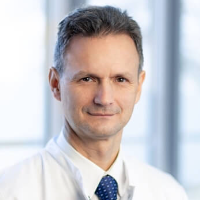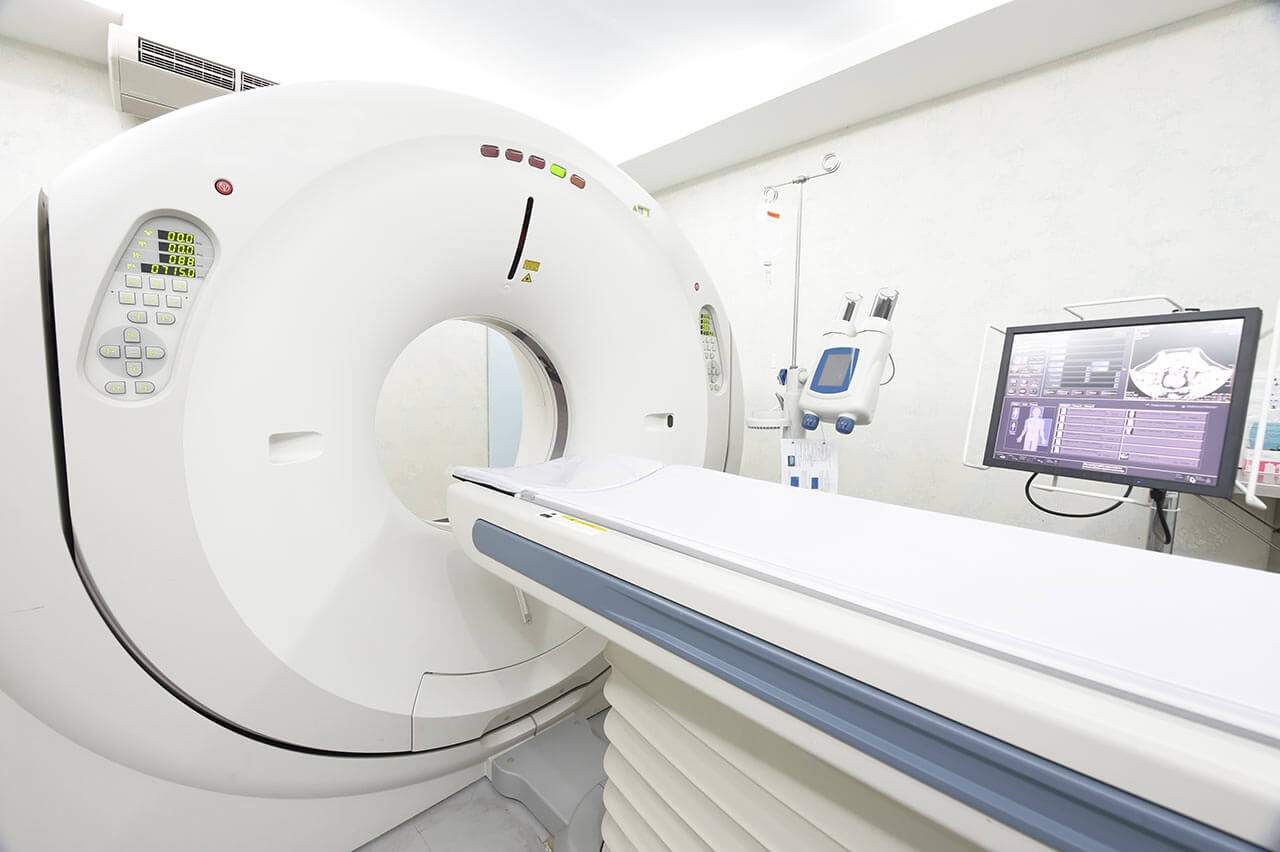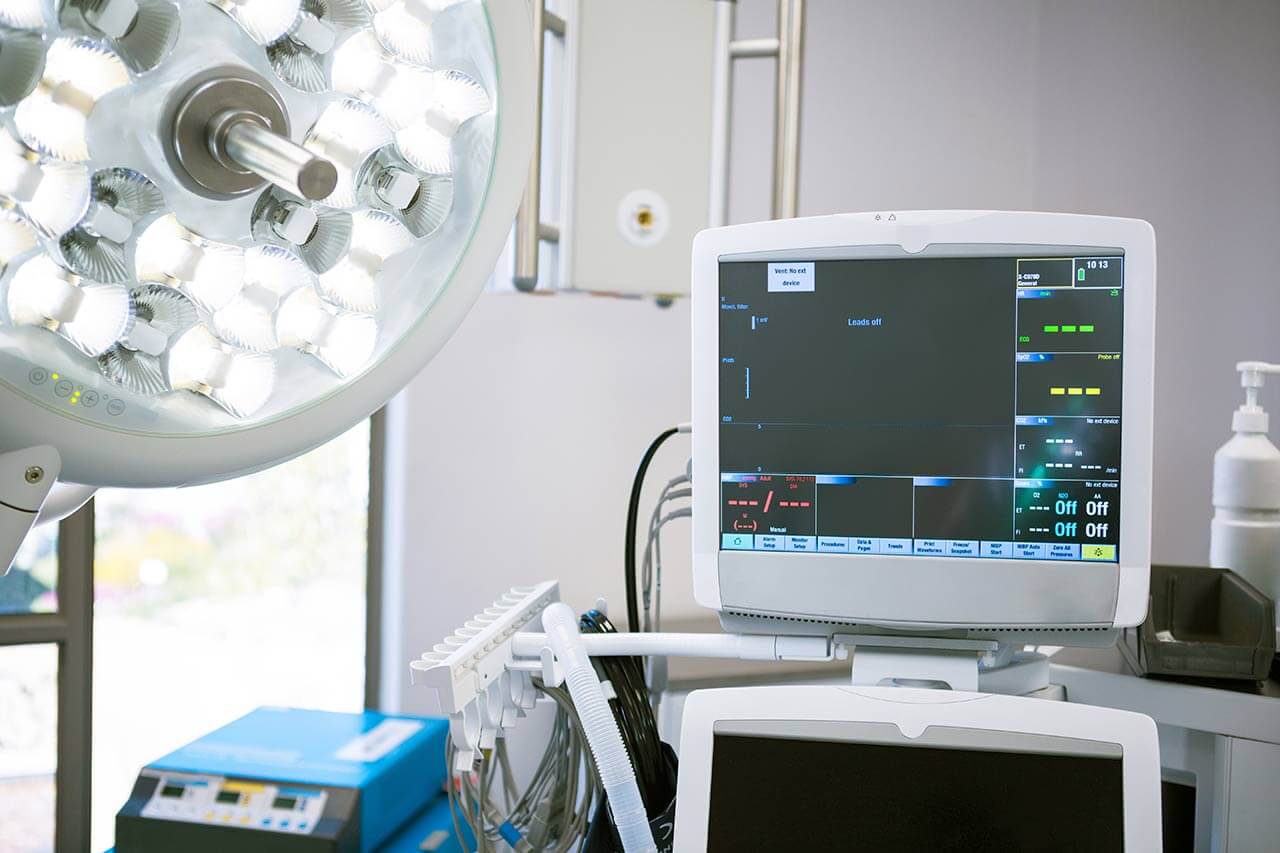
The program includes:
- Initial presentation in the clinic
- clinical history taking
- review of medical records
- physical examination
- laboratory tests:
- complete blood count
- general urine analysis
- biochemical analysis of blood
- TSH-basal, fT3, fT4
- tumor markers
- inflammation indicators
- indicators of blood coagulation
- ultrasound scan
- CT/MRI scan
- course of radiotherapy
- control examinations
- nursing services
- full hospital accommodation
- consultations of related specialists
- explanation of individual treatment plan
How program is carried out
During the first visit, the doctor will conduct a clinical examination and go through the results of previous laboratory tests and instrumental examinations. After that, you will undergo an additional examination, including complete blood count, laboratory assessment of liver and kidney function. Based on the received results, the physician will conduct radiotherapy planning with the help of CT or MRI, make the permanent tattoo marks on the skin and conduct CT simulation in order to assess the accuracy of the rays and the radiation dose. If necessary, related medical specialists will be involved in the elaboration of a treatment regimen (tumor board).
Radiation therapy is carried out as the inpatient procedure, with mandatory admission to the hospital. Before each session the physician will assess your general condition and the marks on the skin. After that, you will be placed in a shielded radiation therapy room, on a special table.
Each radiation therapy session lasts less than half an hour (including preparation). All this time, doctors and nurses are monitoring your condition, you can communicate with them through a loudspeaker. The procedure is completely painless. Depending on the planned course of treatment, you will have from 1 to 3-5 sessions of radiation therapy a week.
After the completion of the radiation therapy course, you will undergo control examinations aimed at assessing your condition and efficacy of treatment. After that you will receive the medical report with detailed recommendations regarding further follow-up and treatment. In the future, you will be able to have a distant consultation with your attending physician and schedule the next course of treatment, if necessary.
Required documents
- Medical records
- MRI/CT scan, PET scan (if available)
Service
You may also book:
 BookingHealth Price from:
BookingHealth Price from:
About the department
The Department of Radiation Therapy and Radiation Oncology at the WEGE Clinic Bonn offers all types of modern radiation therapy for the highly effective treatment of benign and malignant tumors. The department is equipped with three linear accelerators and brachytherapy systems, which provide patients with the safest, most effective, and most sparing irradiation of tissues affected by oncopathology. The department also provides radiotherapy planning and radiosurgery. An ultramodern technical base, exceptional professionalism, and experience of the department's physicians are the cornerstones of successful clinical practice. The department is headed by Prof. Dr. med. Michael Pinkawa.
The department specializes in the treatment of all benign and malignant neoplasms, including metastases. It performs curative procedures as well as palliative care to alleviate symptoms and improve the quality of life of patients with vascular malformations of the brain, functional disorders of the nervous system (for example, epilepsy, trigeminal neuralgia), and degenerative inflammatory and proliferative diseases. Depending on the diagnosis, the optimal treatment regimen is selected for each individual patient. In the case of malignant tumors, each clinical case is reviewed in an interdisciplinary board with the participation of all necessary experts. The physicians also hold preliminary consultations, during which they inform the patient in detail about all stages of the therapeutic process, possible side effects, and the expected outcomes.
An important part of the treatment is the preliminary planning of radiation therapy. The goal of this planning is to provide optimal radiation to the area affected by the pathological process while sparing as much healthy tissue as possible. Treatment planning is based on CT scans, but in some cases additional tests such as MRI and PET may be needed. All scans are used to precisely define the areas to be irradiated during the subsequent course of therapy.
The irradiation itself is performed by the medical-technical radiology assistant under the careful guidance of the specialized physician. The medical-technical radiology assistant imports the data obtained during the treatment planning into the computer system of the linear accelerator. The patient is then placed on the treatment table of the device in the position determined by the individual treatment plan. Depending on the treatment plan, the actual irradiation usually takes only a few minutes. The entire procedure, including preparation, takes no more than 15 minutes. The patient does not feel any pain during the treatment. In some cases, a single session is sufficient, but more often, the patient needs several sessions to better tolerate the therapy and preserve as much healthy tissue as possible. As with any other therapy, the patient will need follow-up examinations to consolidate the results. The first follow-up is usually after 6-8 weeks, then four times a year (for malignant diseases).
The department specializes in stereotactic procedures, which are one of the most accurate and effective types of radiation therapy. During this therapy, a precisely defined dose of radiation is directed to the tumor. This technique differs from classical radiation therapy in high accuracy and dosage, due to which the doctors often manage to reduce the duration of treatment. Stereotaxy is especially effective in the case of irradiation of small tumors. Stereotactic irradiation can be divided into several sessions (fractional therapy) or carried out within a single session (radiosurgery). The number of sessions depends on the location and size of the tumor. As a rule, stereotaxy is used for the treatment of benign and malignant brain tumors, brain metastasis, liver cancer and liver or lymph node metastasis, small lung tumors and lung metastasis, prostate cancer, recurrent tumors, vascular malformations, and bone metastases.
The team of the department's doctors also has unique competencies in radiosurgery (a special type of stereotaxy). As opposed to a conventional surgical intervention, cancer surgery is not invasive and the patient does not experience any pain during treatment and the anesthesia is not required. When performing radiosurgery, the doctors irradiate the tumor only once using a very high and effective dose. Radiosurgery is usually performed to treat tumors with clear boundaries, when the classical surgery cannot be performed due to the localization of the neoplasm (for example, in brain tumors). Radiosurgery is highly accurate and has a minimal negative effect on the healthy tissues.
The department's therapeutic service range is complemented by brachytherapy. Brachytherapy is a particularly effective type of radiation therapy. Unlike the percutaneous irradiation technique, during brachytherapy, the radiation source is located in the body, in the immediate vicinity of the tumor. Since brachytherapy affects a very limited area, the doctors can use a high dose of radiation. In most cases, this type of therapy serves for the treatment of tumors of the female reproductive system, lung cancer, esophageal cancer, and prostate cancer. Brachytherapy can also be carried out as palliative care to alleviate the symptoms.
The department specializes in radiation therapy for the following pathologies:
- Benign diseases
- Acoustic neuroma
- Arteriovenous malformations
- Vascular malformations of the brain
- Chronic musculoskeletal pains
- Degenerative inflammatory diseases
- Inflammatory and proliferative diseases
- Epilepsy
- Functional brain disorders
- Trigeminal neuralgia
- Pituitary adenoma
- Meningioma
- Ledderhose disease
- Dupuytren's contracture
- Scar relapse prevention (keloids)
- Degenerative diseases of the finger, shoulder, knee, and hip joints accompanied by severe pain
- Heel spur, plantar fasciitis
- Penile curvature
- Malignant diseases
- Prostate cancer
- Breast cancer
- Ovarian cancer
- Endometrial cancer
- Uterine cancer
- Cervical cancer
- Endometrial cancer
- Vaginal cancer
- Bowel cancer
- Esophageal cancer
- Liver cancer and liver metastases
- Lung cancer
- Kidney cancer and kidney metastases
- Soft tissue metastases
- Other benign and malignant pathologies
The department offers the following types of radiation therapy:
- Intensity-modulated radiation therapy
- Volumetric modulated arc therapy
- Stereotactic radiation therapy
- Brachytherapy
- Other types of radiation therapy
Curriculum vitae
Since April 2017, Prof. Michael Pinkawa has been the Head Physician of the Department of Radiation Therapy and Radiation Oncology at the WEGE Clinic Bonn. Prior to that, he worked as Senior Physician and Deputy Head of the Department of Radiation Therapy at the University Hospital RWTH Aachen. Prof. Pinkawa is a Member of the German Cancer Society (DKG), within which he is responsible for the certification of Cancer Centers and the awarding of certificates to committees. In addition, the doctor is the author of more than 100 scientific publications. He is one of the leading experts in the world in the use of a special type of radiation therapy for prostate cancer treatment. In 2011, Dr. Pinkawa joined the European Society for Radiotherapy and Oncology (ESTRO).
Photo of the doctor: (c) WEGE Klinik
About hospital
The WEGE Clinic Bonn is a progressive medical facility that offers all the latest diagnostic and treatment methods for the recovery of cancer patients. The clinic was founded by the renowned radiologist and surgeon Robert Janker. Today, its history has more than 80 years of successful clinical practice, which has brought worldwide fame and reputation to the medical center. The clinic specializes in medical oncology, radiation oncology, diagnostic and interventional radiology, and palliative care.
The work of the clinic's medical team is based on the use of sparing and highly specialized therapeutic procedures. Each clinical case is individual and requires a special approach. The specialists of the medical facility guarantee their patients not only the most effective treatment, but also the highest level of medical care, respectful attitude, and understanding of the needs and wishes of each patient.
Patients can be treated on an inpatient or outpatient basis. The clinic's physicians work closely with many specialized cancer centers in Germany, as well as with many private physicians. In addition to conventional cancer treatments, the clinic also offers individual counseling, psychological support, social care, and other related activities.
The outstanding quality of diagnostics and treatment is confirmed by certification according to DIN EN ISO 9001: 2015 standards. The clinic is also certified by the German Cancer Society. The clinic is also a certified cooperation partner of the Cancer Center Bonn-Rhein-Sieg.
Photo: (c) WEGE Klinik, (c) depositphotos
Accommodation in hospital
Patients rooms
The patients at the WEGE Clinic Bonn stay in modern and comfortable rooms. Each room is equipped with an ensuite bathroom with shower and toilet. The standard room includes a comfortable automatically adjustable bed, a bedside table, a table and chairs for receiving visitors, a wardrobe for storing clothes, a radio, a TV, and a telephone (additional charges apply for using a telephone and a TV). The patient rooms also have Wi-Fi.
The patients with disabilities are accommodated in specially equipped rooms. The clinic also provides single enhanced-comfort rooms of a five-star hotel level.
Meals and Menus
The patients of the clinic are offered a healthy and varied diet. The wishes and needs of the patients are always taken into consideration. Patients have a choice of several daily menus, including a full menu, a basic menu, and diet and vegetarian menus. Breakfast and lunch are served in the clinic's cafeteria, while dinner is served in the patient's room.
Patients staying in enhanced-comfort rooms are offered an individual menu. In addition to breakfast, lunch, and dinner, the patient is also provided with coffee and delicious cakes, fruit in the room.
Further details
Standard rooms include:
![]() Toilet
Toilet
![]() Shower
Shower
![]() Wi-Fi
Wi-Fi
![]() TV
TV
Religion
Religious services can be provided upon request.
Accompanying person
During the inpatient program, an accompanying person may stay with you in a patient room or hotel of your choice.
Hotel
During the outpatient program, you may stay in a hotel of your choice. Managers will help you choose the most suitable options.





